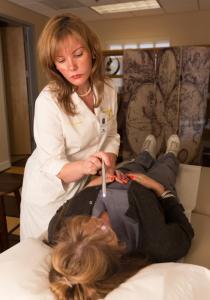
Researcher and neurologist Dr. Mateja de Leonni Stanonik makes her Alzheimer’s research collection available on Blog
Dr. de Leonni’s information is divided in high-level research summaries, such as NIH publications, and comprehensible information for the general public.
But we don't really know what sets these proteins amyloid and tau in motion. Some genetic and environmental risk factors have been identified. Other risk factors are head injuries, depression, and high blood pressure.
Dr. de Leonni works with Alzheimer’s patients on a daily basis, providing Alzheimer’s Dementia Beta Amyloid Plaque PET Scanning, and in-office IV Infusion of Alzheimer’s Medication. Because of her past and current clinical and research work, Dr. de Leonni has accumulated large amounts of research data that she is now gradually making available to interested researchers and the general public. For this purpose, she set up a dedicated website, https://alzheimersresearch.info/
There, the information is divided in high-level research summaries, such as NIH publications, and comprehensible information for the general public interested in Alzheimer’s. Dr. de Leonni Stanonik explains that “in this modern world of ours, more and more medical research becomes available every day. I have made an effort for myself to gather and organize Alzheimer’s information. But this effort can have broader effect if I share it with interested parties. Thus, I decided to make it available on a special website.”
There are several treatment options available for Alzheimer's. Now there are two new treatments, both administered by intravenous infusion, that have shown encouraging results. They are Aducanumab (Aduhelm) and Lecanemab.
The Food and Drug Administration (abbreviated FDA) approved Aducanumab through accelerated approval in June 2021. See https://www.fda.gov/news-events/press-announcements/fda-grants-accelerated-approval-alzheimers-drug
This FDA approval is noteworthy—it was the first in over 18 years. It is the first treatment to attack what many believe is an underlying cause of Alzheimer's disease, the build-up of proteins in the brain. Aducanumab is a so-called monoclonal antibody (MAB) that stimulates the human immune system to break down the plaques that form in the brains of people with dementia.
However, Aducanumab will be discontinued as Alzheimer’s treatment by its manufacturer Biogen in November 2024, not because of safety or efficacy. See https://shorturl.at/fhEK9.
The FDA approved Lecanemab as another treatment for early Alzheimer's, also through the accelerated approval procedure because clinical trials have shown that it removes the sticky proteins in the brains of early-stage Alzheimer's patients. Thus, it is "reasonably likely" that the treatment is effective.
The National Institutes of Health (abbreviated NIH) recently published a related study of Lecanemab. See https://pubmed.ncbi.nlm.nih.gov/36449413/
In brief, the clinical trial had 1,795 participants with early-stage Alzheimer's. The results showed a 27% reduced clinical decline on the global cognitive and functional scale (abbreviated CDR-SB), compared with placebo treatment.
Dr. de Leonni also cautions, however, that “in all medical matters, one should not act based solely on information found on the internet, but instead review the issues with the medical doctor who has the patient’s medical history and has personally examined the patient.”
About Dr. Mateja de Leonni Stanonik
Mateja de Leonni Stanonik, MD, MA, PhD (former Surgeon General of the Republic of Slovenia) is the head of a multidisciplinary Neurology and Psychiatry Clinic, the Vita Medica Institute, in Tucson, Arizona. The focus of her current practice is stroke/vascular neurology, memory issues as well as women's issues within neurological disorders.
Mateja de Leonni Stanonik, BA, BSc, MA, MD, PhD, grew up in Slovenia (formerly Yugoslavia). She completed her undergraduate degrees in Biology and Psychology (BSc.), as well as in German and Political Science (B.A.). She went on to obtain her Master’s degree in Cognitive Psychology/Neurolinguistics and Doctoral (Ph.D.) degree in Neuroscience. In 2007, she completed her M.D. degree at the Saba University School of Medicine, followed by a medical residency in Neurology at George Washington University.
Dr. de Leonni Stanonik is passionate about preserving brain health well into the golden years of life which allows patients to maintain quality of life as much as possible. Thus, she routinely uses treatments to limit cognitive decline.
Dr. Mateja de Leonni Stanonik
VitaMedica Institute
2850 E Skyline Dr., Suite 130
Tucson, Arizona 85718
Tel: (520) 638-5757
Fax: (520) 447-5701
Website: https://vmi.global/
Dr. Mateja de Leonni Stanonik
Vita Medica Institute
+1 520-638-5757
email us here
Visit us on social media:
LinkedIn
YouTube
Other
Dr. Mateja de Leonni Stanonik in "Wear the Gown - Know the Signs and Risks of Stroke"
EIN Presswire does not exercise editorial control over third-party content provided, uploaded, published, or distributed by users of EIN Presswire. We are a distributor, not a publisher, of 3rd party content. Such content may contain the views, opinions, statements, offers, and other material of the respective users, suppliers, participants, or authors.






